Nctrc practice - Study guides, Class notes & Summaries
Looking for the best study guides, study notes and summaries about Nctrc practice? On this page you'll find 309 study documents about Nctrc practice.
Page 2 out of 309 results
Sort by
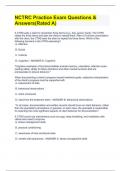
-
NCTRC Practice Exam Questions & Answers(Rated A)
- Exam (elaborations) • 31 pages • 2024
-
Available in package deal
-
- $13.99
- + learn more
NCTRC Practice Exam Questions & Answers(RateA CTRS asks a client to remember three items (e.g., dog, pencil, book). The CTRS states the three items and asks the client to repeat them. After a 5-minute conversation with the client, the CTRS asks the client to repeat the three items. Which of the following domains is the CTRS assessing? A. Affective B. Social C. Cultural D. Cognitive - ANSWER D. Cognitive "Cognitive examples of functional abilities include memory, orientation...
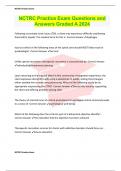
-
NCTRC Practice Exam Questions and Answers Graded A 2024
- Exam (elaborations) • 12 pages • 2024
-
- $12.99
- + learn more
Following a traumatic brain injury (TBI), a client may experience difficulty swallowing food and/or liquids. The medical term for this is -Correct Answer dysphagia Injury to which of the following areas of the spinal cord would MOST likely result in quadriplegia? -Correct Answer Cervical Unlike special recreation, therapeutic recreation is characterized by -Correct Answer individualized treatment planning Upon returning to the hospital after his first community reintegration experience,...
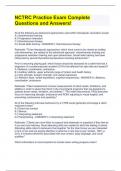
-
NCTRC Practice Exam Complete Questions and Answers!
- Exam (elaborations) • 23 pages • 2024
-
Available in package deal
-
- $12.99
- + learn more
NCTRC Practice Exam Complete Questions and AnswAll of the following are behavioral approaches used within therapeutic recreation except A.) Assertiveness training B.) Progression relaxation C.) Reminiscence therapy D.) Social skills training - ANSWER C. Reminiscence therapy Rationale: "Three therapeutic approaches, which have come to be viewed as entities unto themselves, are related to the behavioral approach. Assertiveness training and progressive relaxation training rest upon behavior...
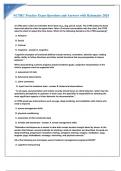
-
NCTRC Practice Exam Questions and Answers with Rationales 2024.
- Exam (elaborations) • 40 pages • 2024
- Available in package deal
-
- $11.49
- + learn more
NCTRC Practice Exam Questions and Answers with Rationales 2024.
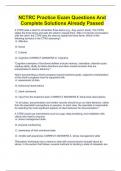
-
NCTRC Practice Exam Questions And Complete Solutions Already Passed
- Exam (elaborations) • 31 pages • 2024
- Available in package deal
-
- $15.99
- + learn more
NCTRC Practice Exam Questions And Complete Solutions Already Passed
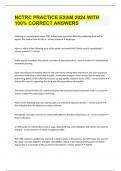
-
NCTRC PRACTICE EXAM 2024 WITH 100% CORRECT ANSWERS
- Exam (elaborations) • 9 pages • 2024
-
- $15.49
- + learn more
NCTRC PRACTICE EXAM 2024 WITH 100% CORRECT ANSWERS Following a traumatic brain injury (TBI), a client may experience difficulty swallowing food and/or liquids. The medical term for this is - correct answer dysphagia Injury to which of the following areas of the spinal cord would MOST likely result in quadriplegia? - correct answer Cervical Unlike special recreation, therapeutic recreation is characterized by - correct answer individualized treatment planning Upon returning to the h...
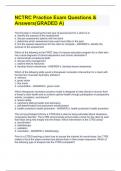
-
NCTRC Practice Exam Questions & Answers(GRADED A)
- Exam (elaborations) • 15 pages • 2024
-
Available in package deal
-
- $17.99
- + learn more
The first step in choosing the best type of assessment for a client is to a. identify the purpose of the assessment b. discuss assessment options with the client c. determine which assessment was used most often in the past d. find the easiest assessment for the client to complete - ANSWER a. identify the purpose of the assessment Which of the following is the FIRST step of a leisure education program for a client who has a dual diagnosis of clinical depression and chronic alcoholism? a....
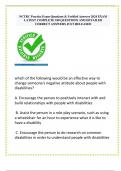
-
NCTRC Practice Exam Questions & Verified Answers 2024 EXAM LATEST COMPLETE 180 QUESTIONS AND DETAILED CORRECT ANSWERS JUST RELEASED
- Exam (elaborations) • 62 pages • 2024
- Available in package deal
-
- $27.99
- + learn more
NCTRC Practice Exam Questions & Verified Answers 2024 EXAM LATEST COMPLETE 180 QUESTIONS AND DETAILED CORRECT ANSWERS JUST RELEASED
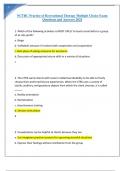
-
NCTRC Practice of Recreational Therapy Multiple Choice Exam Questions and Answers 2024.
- Exam (elaborations) • 76 pages • 2024
- Available in package deal
-
- $12.49
- + learn more
NCTRC Practice of Recreational Therapy Multiple Choice Exam Questions and Answers 2024.
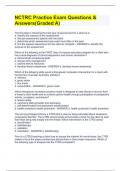
-
NCTRC Practice Exam Questions & Answers(Graded A)
- Exam (elaborations) • 15 pages • 2024
-
Available in package deal
-
- $11.49
- + learn more
NCTRC Practice Exam Questions & Answers(Graded A)The first step in choosing the best type of assessment for a client is to a. identify the purpose of the assessment b. discuss assessment options with the client c. determine which assessment was used most often in the past d. find the easiest assessment for the client to complete - ANSWER a. identify the purpose of the assessment Which of the following is the FIRST step of a leisure education program for a client who has a dual diagnosis o...

$6.50 for your textbook summary multiplied by 100 fellow students... Do the math: that's a lot of money! Don't be a thief of your own wallet and start uploading yours now. Discover all about earning on Stuvia


